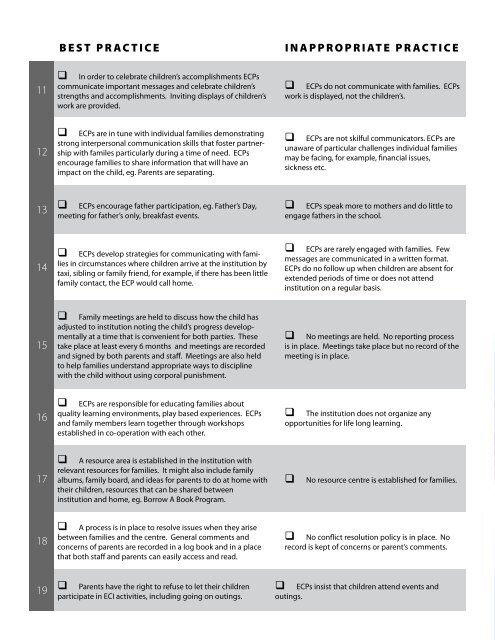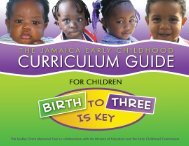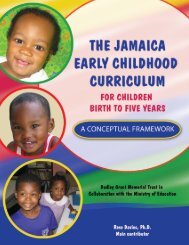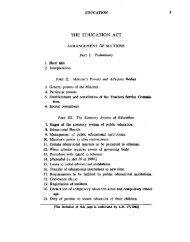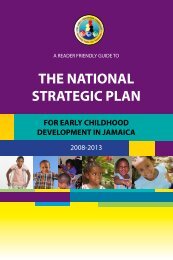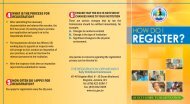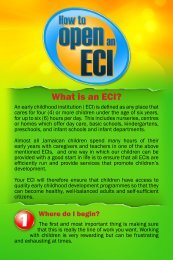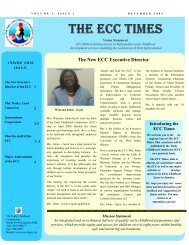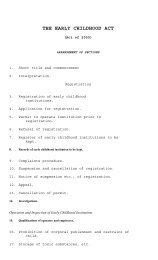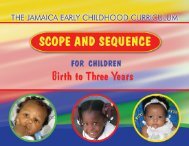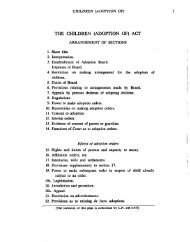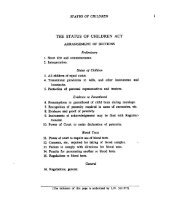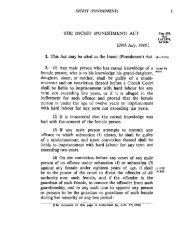Best Practices - The Early Childhood Commission
Best Practices - The Early Childhood Commission
Best Practices - The Early Childhood Commission
You also want an ePaper? Increase the reach of your titles
YUMPU automatically turns print PDFs into web optimized ePapers that Google loves.
B E S T P R A C T I C E<br />
I N A P P R O P R I AT E P R A C T I C E<br />
11<br />
<br />
In order to celebrate children’s accomplishments ECPs<br />
communicate important messages and celebrate children’s<br />
strengths and accomplishments. Inviting displays of children’s<br />
work are provided.<br />
<br />
ECPs do not communicate with families. ECPs<br />
work is displayed, not the children’s.<br />
<strong>Best</strong> <strong>Practices</strong><br />
for Interactions<br />
and Relationships<br />
12<br />
<br />
ECPs are in tune with individual families demonstrating<br />
strong interpersonal communication skills that foster partnership<br />
with familes particularly during a time of need. ECPs<br />
encourage families to share information that will have an<br />
impact on the child, eg. Parents are separating.<br />
<br />
ECPs are not skilful communicators. ECPs are<br />
unaware of particular challenges individual families<br />
may be facing, for example, financial issues,<br />
sickness etc.<br />
13<br />
14<br />
15<br />
ECPs encourage father participation, eg. Father’s Day,<br />
meeting for father’s only, breakfast events.<br />
<br />
ECPs develop strategies for communicating with families<br />
in circumstances where children arrive at the institution by<br />
taxi, sibling or family friend, for example, if there has been little<br />
family contact, the ECP would call home.<br />
<br />
Family meetings are held to discuss how the child has<br />
adjusted to institution noting the child’s progress developmentally<br />
at a time that is convenient for both parties. <strong>The</strong>se<br />
take place at least every 6 months and meetings are recorded<br />
and signed by both parents and staff. Meetings are also held<br />
to help families understand appropriate ways to discipline<br />
with the child without using corporal punishment.<br />
<br />
ECPs speak more to mothers and do little to<br />
engage fathers in the school.<br />
<br />
ECPs are rarely engaged with families. Few<br />
messages are communicated in a written format.<br />
ECPs do no follow up when children are absent for<br />
extended periods of time or does not attend<br />
institution on a regular basis.<br />
<br />
No meetings are held. No reporting process<br />
is in place. Meetings take place but no record of the<br />
meeting is in place.<br />
S TA N D A R D 3 : <br />
I N T E R A C T I O N S A N D<br />
R E L AT I O N S H I P S W I T H C H I L D R E N<br />
E a r l y c h i l d h o o d s t a f f h a s t h e c h a r a c t e r i s t i c s ,<br />
t r a i n i n g , k n o w l e d g e , s k i l l s a n d a t t i t u d e t o p r o m o t e<br />
p o s i t i v e b e h a v i o u r s a n d r e d u c e d i f f i c u l t a n d<br />
c h a l l e n g i n g b e h a v i o u r s i n c h i l d r e n<br />
16<br />
<br />
ECPs are responsible for educating families about<br />
quality learning environments, play based experiences. ECPs<br />
and family members learn together through workshops<br />
established in co-operation with each other.<br />
<br />
<strong>The</strong> institution does not organize any<br />
opportunities for life long learning.<br />
17<br />
<br />
A resource area is established in the institution with<br />
relevant resources for families. It might also include family<br />
albums, family board, and ideas for parents to do at home with<br />
their children, resources that can be shared between<br />
institution and home, eg. Borrow A Book Program.<br />
<br />
No resource centre is established for families.<br />
18<br />
19<br />
<br />
A process is in place to resolve issues when they arise<br />
between families and the centre. General comments and<br />
concerns of parents are recorded in a log book and in a place<br />
that both staff and parents can easily access and read.<br />
Parents have the right to refuse to let their children<br />
participate in ECI activities, including going on outings.<br />
<br />
<br />
No conflict resolution policy is in place. No<br />
record is kept of concerns or parent’s comments.<br />
ECPs insist that children attend events and<br />
outings.<br />
THREE TO FIVE YEAR OLDS<br />
29


